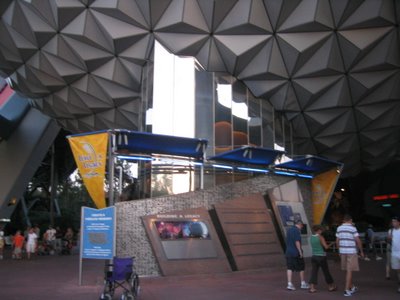
Epcot has always been a haven for marketing to guests. From the earliest conception (even going back to Walt’s day), Epcot was a place where large corporations could showcase their innovations and prove why they were the best in their field.
When done well, as at Spaceship Earth or The Land, having a pavilion sponsored by a large company is relatively unintrusive. When less successful, as at Universe of Energy or Imagination, the sponsor’s message can seem heavy-handed and a little too obvious.
And then there’s Disney itself.
Put aside your belief, for a moment, that General Motors is the worst offender with Test Track, and instead think of the ubiquitous Disney Vacation Club kiosks scattered throughout Epcot (and, indeed, all over the Walt Disney World Resort).
These kiosks completely pull you out of your vacation experience and remind you that Disney is, in the end, after your money. Completely unthemed to their surroundings, they exist purely as a shill for timeshares, and timeshare salespeople – whether they work for Disney or not – have always ranked somewhere between lawyers and used-car salespeople on the scale of respectability.
Sorry if you’re a timeshare salesperson, related to one or you’ve purchased from one – but decades worth of reading about people who lost their savings on timeshares or were unable to sell theirs when their finances got tight have hardly given timeshares a good name.
I’ve no doubt that Disney Vacation Club timeshares are nice; in fact, I’ve stayed in a couple of the rooms on occasion. But the last thing I want to be thinking about when I’ve just dropped $7,000 on vacation is how to finance another $15,000 so I can make the dream last all year long.
Isn’t it enough that Disney Vacation Club gets to shout out its message on the in-room channel, in literature found in all hotel rooms, in Disney-owned magazines and in the resorts themselves? In a way, I have less objection to those methods of selling, because at least they’re out of the parks themselves.
But now they’re all over the parks, and they are sorely out of place at Epcot. Walking along the plaza between Mission: Space and Innoventions East, I ran across this young man (above). He looked like he had many, many better things to be doing with his time than waiting for some unsuspecting guest to walk up to him and say, “What’s this all about?” That would be his cue to launch into a spiel aimed solely and squarely at getting the guest to want to know more and, ultimately, to steal from little Sally’s college fund to buy a piece of the magic.
Epcot is about future possibilities, about an optimistic road ahead, about the opportunities that are in front of us. In my book, those future possibilities don’t include trying to figure out how to find another $300 a month to pay for a timeshare.
But let’s for a second imagine that I did want to partake, that I am interested in learning more. The gale-force winds that DVC blows throughout the resorts would be enough to remind me that I should probably log on to the DVC website or call that 800 number (something even Walt Disney World reservations doesn’t have!).
I don’t need this sales pitch interfering with my enjoyment of Epcot, ruining the ambience of Future World.
Here’s hoping that Lasseter & Co. will see how offensive these elaborate kiosks are and do away with this particular piece of “magic.” Let Epcot be for imagining life ahead, not thinking about mortgage payments.













